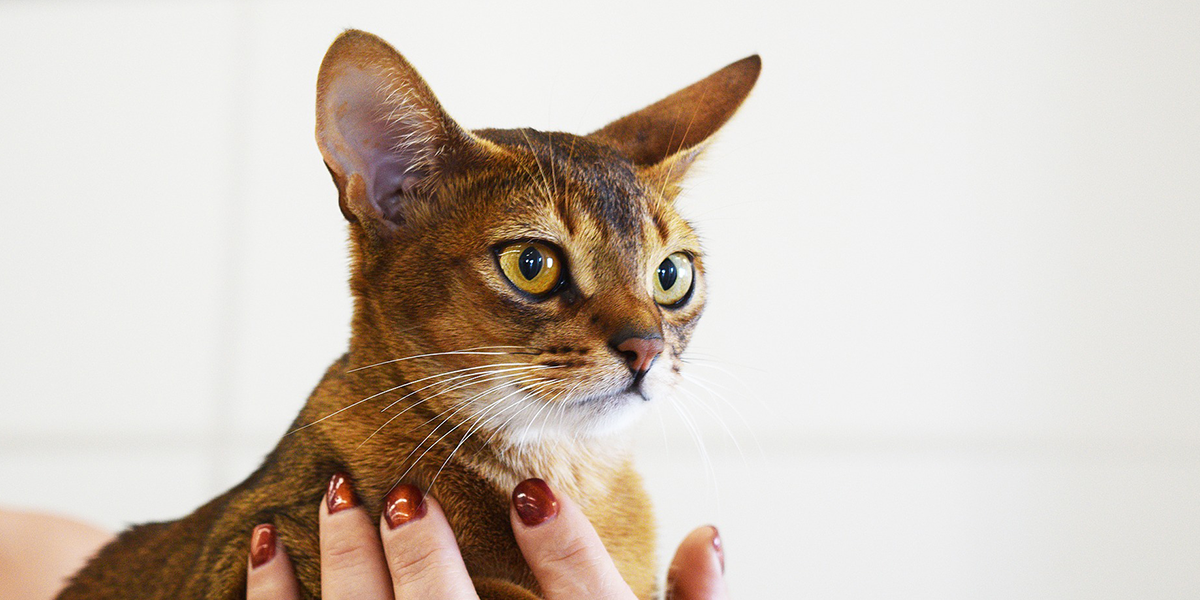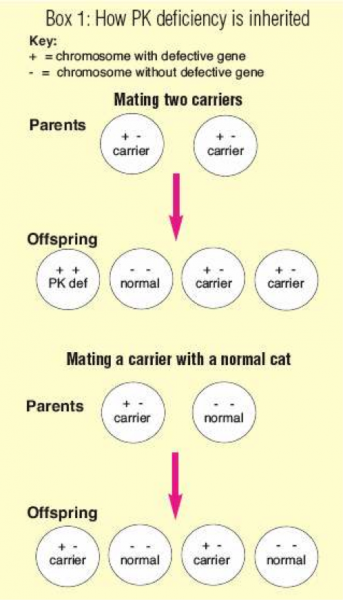Pyruvate kinase (PK) deficiency is an inherited disease occasionally encountered in Abyssinian and Somali cats, and also reported rarely in the domestic shorthair cat.
Pyruvate kinase is an enzyme found within red blood cells (erythrocytes) in the circulation, which enables them to produce energy to survive. If this enzyme is lacking, the lifespan (survival time) of the red blood cells is significantly reduced, resulting in a reduction in the number of red blood cells in the circulation (anaemia).
What signs does it cause?
The main consequence of PK deficiency is the development of anaemia. However, since the body can quickly produce new red blood cells (in the bone marrow), the anaemia is usually only intermittently detectable.
Most of the time the anaemia is either occurs very slowly or occurs mildly, enabling the cat to adapt to the lower number of red blood cells and not show any obvious clinical signs.
Anaemia itself often results in only vague signs such as lethargy and lack of appetite. However, a rapid severe life-threatening anaemia can also develop. Although PK deficiency is hereditary, because the anaemia is often mild and intermittent clinical signs may not necessarily be noticed until the cat is quite old.
How is PK deficiency inherited?
A single pair of genes is responsible for development of PK deficiency. The disease is inherited as an autosomal recessive trait (see diagram). This means that both genes have to be defective for a cat to develop PK deficiency. If only one gene is defective and one is normal (this would be called a heterozygote) the normal gene is ‘dominant’ over the abnormal ‘recessive’ gene and the cat will only be a carrier of the defect but will not develop any signs or disease.
Affected cats (homozygous – having two copies the same – for the abnormal gene) arise when affected or carrier cats are mated with each other. Since carrier cats remain healthy though, and since affected cats may not necessarily be detected until they are a few years of age, the potential exists for both carrier and affected cats to have significant numbers of litters before the disease is identified.
While mating carrier cats together or carrier and affected cats together will always carry a risk of producing affected kittens, a carrier cat can be safely mated with a health non-carrier normal cat (carrying a pair of completely normal genes) as in this case none of the offspring will be affected (although around 1 in 2 will be carriers).
What tests are available?
Fortunately a reliable test exists for PK deficiency. This is a genetic (DNA) test that can be performed on either a blood sample or cheek swab. Specialist veterinary laboratories are able to offer this test which, if performed properly, will be highly reliable and able to show if a cat is completely healthy, a carrier, or contains two copies of the abnormal gene and is therefore affected with PK deficiency.
By determining the genetic status of cats, it is not only possible to identify and diagnose clinically affected cats, but it is also possible to devise appropriate breeding programmes to reduce the number of cats carrying this defect and avoid breeding affected cats.
Why worry about PK deficiency?
PK deficiency is inherited and has been reported in many countries across the world. Some data suggests up to 15-30% or more of Abyssinian and Somali cats may be carriers of the defective gene.
It is important to perform the gene test in pedigree Abyssinian and Somali cats that are intended for breeding so that selective breeding can be carried out to gradually reduce the number of carriers and so reduce the risk of affected cats being born. This is important because although the disease may be mild, on occasions it can produce life-threatening anaemia.
If you are considering buying an Abyssinian or Somali cat, always ask the breeder if they have had their cats tested for PK deficiency and ask to see the results.
Thank you for visiting our website, we hope you have found our information useful.
All our advice is freely accessible to everyone, wherever you are in the world. However, as a charity, we need your support to enable us to keep delivering high quality and up to date information for everyone. Please consider making a contribution, big or small, to keep our content free, accurate and relevant.
Support International Cat Care from as little £3
Thank you.
Donate Now



